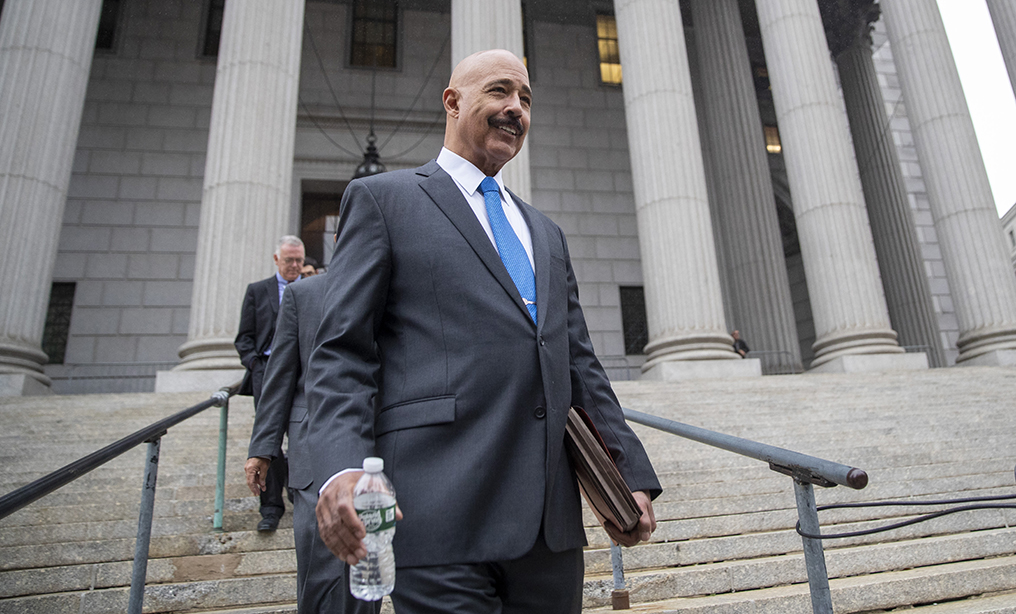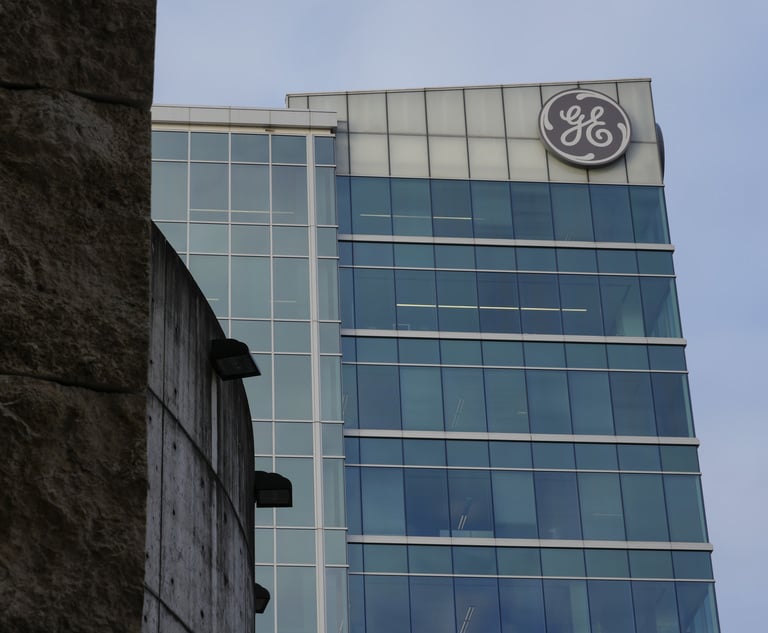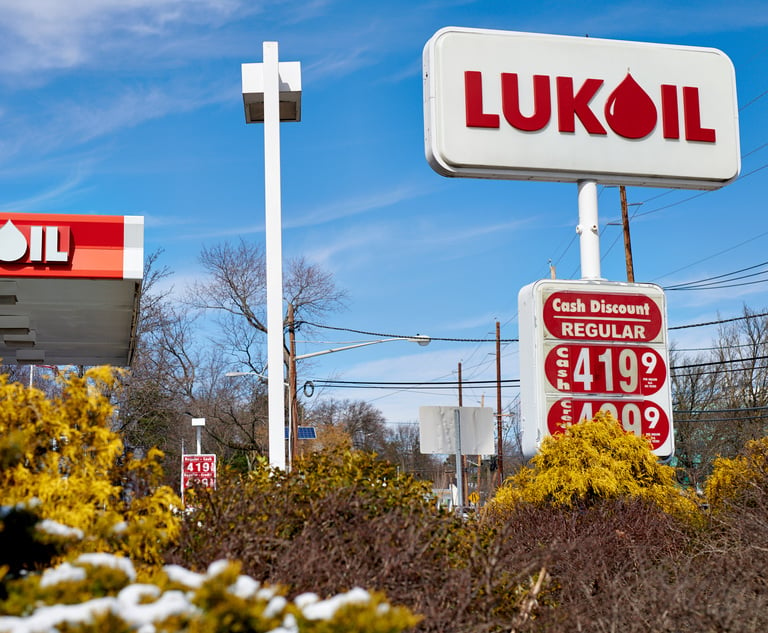Manhattan Judge Clears Exxon in NY AG's Lawsuit Over Accounting for Climate Change Risks
The decision came with one caveat, with Manhattan Supreme Court Justice Barry Ostrager saying the decision does not represent a vindication of Exxon Mobil's environmental stewardship. But he said the case implicated securities fraud, not the environmental footprint of the energy company.
December 10, 2019 at 10:32 AM
4 minute read
 Ted Wells Jr., the lead attorney for Exxon, leaves Manhattan Supreme Court in October. Photo: Mary Altaffer/AP
Ted Wells Jr., the lead attorney for Exxon, leaves Manhattan Supreme Court in October. Photo: Mary Altaffer/AP
A Manhattan judge ruled Tuesday that the New York Attorney General's Office failed to prove that energy giant Exxon Mobil misled its investors, weeks after a trial that included extensive discussion of the company's climate change forecasts.
The finding represented a major victory for Theodore Wells and his colleagues at Paul, Weiss, Rifkind, Wharton & Garrison, who represent Exxon.
New York County Supreme Court Justice Barry Ostrager ruled that the Attorney General's Office's claims—that Exxon violated New York's Martin Act, which vastly extends the reach of the state attorney general, and engaged in consistent fraud—were without merit.
The decision came with one caveat, with the justice saying the decision does not represent a vindication of Irving, Texas-based Exxon Mobil's environmental stewardship.
Ostrager noted that his opinion does not "absolve ExxonMobil from responsibility for contributing to climate change through the emission of greenhouse gases in the production of its fossil fuel products."
But Ostrager said the case implicated securities fraud, not the environmental footprint of the energy company.
"ExxonMobil does not dispute either that its operations produce greenhouse gases or that greenhouse gases contribute to climate change," Ostrager wrote. "But ExxonMobil is in the business of producing energy, and this is a securities fraud case, not a climate change case."
Exxon disclosed its climate change risk calculations to investors by 2014, Ostrager found. In March of that year, the company published two reports discussing its response to climate change and related regulation.
Those reports were widely disseminated by Exxon but virtually ignored by investors, Ostrager wrote.
A sentence in one report, which became a major focus at trial, mentioned that Exxon required its businesses to include forecasted greenhouse gas costs "where appropriate." Wells argued at trial that that language meant the statement could not be material.
Those two words "could have been written in bold type," Ostrager wrote, but he found that it did not otherwise present a problem.
Ostrager also found that even if the AG's Office had not conceded claims of equitable fraud and common-law fraud at the beginning of its closing argument, Exxon would not have been held liable for those charges.
The state's expert witness testimony was "eviscerated" during cross-examination, Ostrager found. In contrast, he wrote, the testimony of current and former Exxon employees was "uniformly favorable" to Exxon.
In a statement, New York Attorney General Letitia James said her office will continue to fight for corporate responsibility and against climate change despite Tuesday's ruling.
"For the first time in history, ExxonMobil was compelled to answer publicly for their internal decisions that misled investors," she said. "The oil giant never took seriously the severe economic impact that climate change regulations would have on the company, contrary to what they were telling the public."
In a statement, Wells said this is a landmark case.
"We commend ExxonMobil for having the courage to vindicate itself against these meritless claims," he said.
David Miller, a Greenberg Traurig partner and former prosecutor in the Southern District of New York, said this case is another example of the AG's Office bringing high-profile enforcement actions with "a political overlay."
"Those kinds of enforcement actions are not new from the New York AG's Office," he said, citing cases against Facebook, the National Rifle Association and others as examples.
Ostrager's decision was unambiguously in Exxon's favor, Miller said.
"The court appropriately decided this bench trial based on the claims, the law and the facts, and did so without injecting politics into its decision," he said.
READ MORE:
Greenhouse Gas Costs Were Not Material in Exxon Decision-Making, Rex Tillerson Says
Tillerson Expected to Testify as Trial Begins in NY AG's Lawsuit Against Exxon
NY AG's Office Accuses Exxon Mobil of Trying to Discourage Witnesses, Delay Trial
This content has been archived. It is available through our partners, LexisNexis® and Bloomberg Law.
To view this content, please continue to their sites.
Not a Lexis Subscriber?
Subscribe Now
Not a Bloomberg Law Subscriber?
Subscribe Now
NOT FOR REPRINT
© 2025 ALM Global, LLC, All Rights Reserved. Request academic re-use from www.copyright.com. All other uses, submit a request to [email protected]. For more information visit Asset & Logo Licensing.
You Might Like
View All
Oil Co. Alleges Plot to Drive Away Competition in NYC's Liquid Fuel Market
3 minute read

GE Agrees to $362.5M Deal to End Shareholder Claims Over Power, Insurance Risks
2 minute read
Lukoil Pan Americas Sues Investment Firm Over Alleged $18 Million Breach
Law Firms Mentioned
Trending Stories
- 1Veritext Legal Solutions Announces the Past Acquisitions of Three Alternative Dispute Resolution Firms
- 2Sarno da Costa D’Aniello Maceri LLC Announces Addition of New Office in Eatontown, NJ, and Named Partner
- 3LSU General Counsel Quits Amid Fracas Over First Amendment Rights of Law Professor
- 4An Eye on ‘De-Risking’: Chewing on Hot Topics in Litigation Funding With Jeffery Lula of GLS Capital
- 5Arguing Class Actions: With Friends Like These...
Who Got The Work
J. Brugh Lower of Gibbons has entered an appearance for industrial equipment supplier Devco Corporation in a pending trademark infringement lawsuit. The suit, accusing the defendant of selling knock-off Graco products, was filed Dec. 18 in New Jersey District Court by Rivkin Radler on behalf of Graco Inc. and Graco Minnesota. The case, assigned to U.S. District Judge Zahid N. Quraishi, is 3:24-cv-11294, Graco Inc. et al v. Devco Corporation.
Who Got The Work
Rebecca Maller-Stein and Kent A. Yalowitz of Arnold & Porter Kaye Scholer have entered their appearances for Hanaco Venture Capital and its executives, Lior Prosor and David Frankel, in a pending securities lawsuit. The action, filed on Dec. 24 in New York Southern District Court by Zell, Aron & Co. on behalf of Goldeneye Advisors, accuses the defendants of negligently and fraudulently managing the plaintiff's $1 million investment. The case, assigned to U.S. District Judge Vernon S. Broderick, is 1:24-cv-09918, Goldeneye Advisors, LLC v. Hanaco Venture Capital, Ltd. et al.
Who Got The Work
Attorneys from A&O Shearman has stepped in as defense counsel for Toronto-Dominion Bank and other defendants in a pending securities class action. The suit, filed Dec. 11 in New York Southern District Court by Bleichmar Fonti & Auld, accuses the defendants of concealing the bank's 'pervasive' deficiencies in regards to its compliance with the Bank Secrecy Act and the quality of its anti-money laundering controls. The case, assigned to U.S. District Judge Arun Subramanian, is 1:24-cv-09445, Gonzalez v. The Toronto-Dominion Bank et al.
Who Got The Work
Crown Castle International, a Pennsylvania company providing shared communications infrastructure, has turned to Luke D. Wolf of Gordon Rees Scully Mansukhani to fend off a pending breach-of-contract lawsuit. The court action, filed Nov. 25 in Michigan Eastern District Court by Hooper Hathaway PC on behalf of The Town Residences LLC, accuses Crown Castle of failing to transfer approximately $30,000 in utility payments from T-Mobile in breach of a roof-top lease and assignment agreement. The case, assigned to U.S. District Judge Susan K. Declercq, is 2:24-cv-13131, The Town Residences LLC v. T-Mobile US, Inc. et al.
Who Got The Work
Wilfred P. Coronato and Daniel M. Schwartz of McCarter & English have stepped in as defense counsel to Electrolux Home Products Inc. in a pending product liability lawsuit. The court action, filed Nov. 26 in New York Eastern District Court by Poulos Lopiccolo PC and Nagel Rice LLP on behalf of David Stern, alleges that the defendant's refrigerators’ drawers and shelving repeatedly break and fall apart within months after purchase. The case, assigned to U.S. District Judge Joan M. Azrack, is 2:24-cv-08204, Stern v. Electrolux Home Products, Inc.
Featured Firms
Law Offices of Gary Martin Hays & Associates, P.C.
(470) 294-1674
Law Offices of Mark E. Salomone
(857) 444-6468
Smith & Hassler
(713) 739-1250






